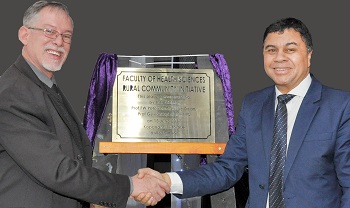Latest News Archive
Please select Category, Year, and then Month to display items
14 June 2024
|
Story Anthony Mthembu
|
Photo Suplied
 Jeremiah Hlahla, a UFS student completing his PhD in Botany at the University of Debrecen as part of an exchange initiative funded by the Erasmus+ Mobility Programme.
Jeremiah Hlahla, a UFS student completing his PhD in Botany at the University of Debrecen as part of an exchange initiative funded by the Erasmus+ Mobility Programme.
As part of an exchange initiative facilitated by the Erasmus+ Mobility Programme, Jeremiah Hlahla, a student at the University of the Free State (UFS), is nearing the completion of his PhD studies at the University of Debrecen in Hungary. Hlahla’s journey, which began in February 2024 and is set to conclude in July 2024, has been a remarkable learning opportunity. “As a first time-traveller to Europe, I have thoroughly enjoyed engaging with people from different countries and cultures,” he said.
The benefits of international collaboration
Hlahla is currently pursuing a PhD in Botany, focusing on plant stress physiology. “My current PhD project investigates the physiological, biochemical and morphological responses of vegetable-type soybean, or edamame, to combined drought and heat stress,’’ he explained. He considers the University of Debrecen the ideal institution to complete his research due to its extensive expertise and resources in similar projects. He noted that his colleagues at Debrecen conduct significant work on plant protection against biotic and abiotic stresses, including salt and drought stress, as well as proteins and amino acids in barley and other legumes.
Given the vast knowledge available on similar projects, Hlahla has found substantial engagement with his work at the University of Debrecen. “Upon arrival, I delivered an introductory lecture presenting my UFS project on the synergistic effects of combined drought and heat stress on the physiology and biochemistry of edamame. It was an engaging session as everyone could relate to my work and asked many questions,’’ he said.
Insights gained from the exchange
Hlahla has also gained valuable lessons that will assist him in his research career, including biotechnology and physiology tools. “I learned how to prepare samples and use high-performance liquid chromatography (HPLC) and reversed-phase ultra-high-performance liquid chromatography (UHPLC) to quantify proteins and amino acids,’’ he said. These techniques are beneficial not only for his current work but will also support future soybean research.
As his experience at the University of Debrecen nears its end, Hlahla reflects on the collaborations and friendships he has formed, which stand out as a significant highlight.
UFS Faculty of Health Sciences opens student residence in Trompsburg
2017-07-06

Official unveiling of the memorial plaque by
Prof Gert van Zyl, Dean of the Faculty of Health Sciences,
and Prof Francis Petersen, Rector and Vice-Chancellor
of the University of the Free State.
Photo: Charl Devenish
The University of the Free State’s (UFS) Faculty of Health Sciences has, as part of its commitment to student and community development, established a student residence in the town of Trompsburg in the Kopanong Local Municipality. The faculty officially opened the Rural Community Initiative and student residence in June 2017. The newly developed student residence has 10 apartments which could each accommodate six individuals. A housemaster resides on the premises and acts as manager of the facility. All areas of the residence are Wi-Fi covered and it has a 24-hour security service.
Importance of the residence
The goal of the Kopanang le fodise – Unite to heal programme is to develop a community-centred collaborative framework for sustainable, holistic healthcare and social development which is incorporated in the curricula of the faculty. During 2016, a total of 324 fourth-year students have each spent at least a week in primary healthcare facilities on a Community Based Education and Inter-Professional Education platform in Trompsburg and Springfontein in the Kopanong Municipality.
“This programme was commissioned to fulfil a specific goal. We are connecting our students with the community. The support of everyone coming together caused this to move from being just a spark, to a blaze. This is all our project,” said Dr René Botha, coordinator for Community-based Education and Rural Health in the faculty.
Community outreach a priority
“This is an innovative project that has been able to bring health and health-related issues to the community. One of the UFS’ three focus areas is community engagement. This project is primarily focused on serving the community, but also on the academic element, which is student development,” said Prof Francis Petersen, Rector and Vice-Chancellor of the UFS.
Prof Petersen commended the project on being the first of its kind in the South African Health Sciences sector. The platform will also be used for research purposes that will enrich the sector. Prof Petersen challenged the Kopanong community to give their input by answering two questions: What is the UFS good at? What is the UFS good for?
Reaching for the stars
“I am a dreamer and I have to reach, and if I reach, I reach for the stars. Today we are very lucky, because we have grabbed that star,” said Prof Gert van Zyl, Dean of the UFS Faculty of Health Sciences.
Prof Van Zyl reminded the audience that they possess the power to change challenges into stars by approaching them with careful thought, planning, and motivation. Prof Van Zyl concluded by stating that the rural community initiative is for the community, and that the faculty is just the facilitators.